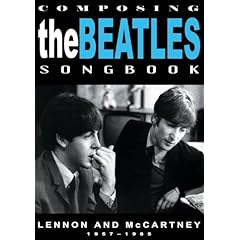Post by yerblues1968 on Jul 12, 2008 23:51:51 GMT -5

COMPOSING THE BEATLES SONGBOOK:
LENNON AND McCARTNEY (1957 - 1965)
Released: March 18, 2008
Running Time: 79 minutes
Product Description
This independent documentary film reviews the partnership music and impact of Lennon and McCartney as composers. From the day they met in 1957 until the release of the Rubber Soul album at the end of 1965 the film dissects and contrasts reassesses and ultimately provides one of the finest films made about the band during this period. Drawing on rare footage classic performances and penetrating revelations from friends of the pair Beatles academics and musicologists this program discovers the true story of how those classic songs were written. It features contributions from; friends Barry Miles Klaus Voorman and Maureen Cleaves; musicians Alan Moore and Chris Ingham; journalists Robert Christgau [Village Voice] and Anthony De Curtis [Rolling Stone]; authors Johnny Rogan Pete Doggett Steve Turner and Nigel Williamson and broadcaster Paul Gambaccini.Track Listing/Features: Love Me Do She Loves You Can't Buy Me Love Hard Day's Night Help Yesterday I'm A Loser You've Got To Hide Your Love Away Nowhere Man Norwegian Wood Michelle + many others
Customer Review
A Wonderful Analysis of One of the Greatest Pop Songwriting Teams of All Time, March 17, 2008
By Michael Dalton (Eureka, CA United States)
Music documentaries don't get much better than this, especially if you are a fan of The Beatles. What could be better than a variety of music experts and friends of the band analyzing one of the greatest pop songwriting duos of all time?
This focuses on the formative years of the partnership that culminated in the landmark release of Rubber Soul. The film explores the early working relationship of Lennon and McCartney, which was mostly collaborative. They enhanced each other's work to a greater degree than in later years when they along with the other Beatles became like solo artists with a backing band.
The release of Hard Day's Night marked a significant change in the relationship. "Can't Buy Me Love," the first single, was clearly a McCartney song, just as "Hard Day's Night" was a distinctly Lennon song. Instead of the two singing together, for the first time each sang separately with double-tracked vocals. It was just the beginning of a divide that would grow in time.
The analysis of their personalities as well as the evolution of their songwriting skills is what makes this so fascinating. Temperament and different backgrounds, along with varied influences were all factors that shaped their songwriting.
Bob Dylan turned out to be one of the monumental influences, especially to Lennon. After the release of The Freewheelin' Bob Dylan, The Beatles began to change musically and lyrically. One small sign was Lennon's use of the harmonica on "I Should Have Known Better" and his use of the harmonica-holder, which Dylan had popularized.
Dylan propelled The Beatles to more serious songwriting. Here was a man that was eloquently sharing his life experiences in song. It may have inspired Lennon to write "In My Life," one of The Beatles' most beautiful songs. Dylan's influence led to songs like "I'm A Loser" and "Nowhere Man" that were somewhat confessional and showed a darker side of Lennon's life. He shocked people in 1970 by revealing that the song "Help" was autobiographical. Lennon's discreet writing of a sexual encounter on "Norwegian Wood (This Bird has Flown)" may be another Dylan influence.
Though they had shared influences, McCartney's development was different. One of the surprising things is just how many songs he gave away that became huge hits for other artists. Some songs didn't quite fit The Beatles mode. His gift for melody was obvious, and unlike Lennon, who had a more narrow musical background, he had a greater range of music to draw from. His early exposure to Tin Pan Alley, jazz and show tunes provided him with the inspiration to create songs like "Till There Was You" and "A Taste of Honey." This would lead to "Yesterday," a modern classic, and "Michelle." Both songs had broad appeal and gave The Beatles greater respectability.
After the release of Rubber Soul, which some critics regard as the band's finest collaborative album, the divide between Lennon and McCartney continued to grow in more ways than one. They would both continue to be innovators, but they would not work together as closely as they once had. This is where the analysis ends.
There are plenty of rare photos and digitally enhanced performance clips, which look and sound fantastic. It's worth having for this alone, but the interviews are excellent and often include analysis of specific songs. Like any great performance, you are left wanting more. If you are a Beatles's fan, you can only hope for more installments.
Composing The Beatles Songbook: Lennon and McCartney (1957 - 1965) may be purchased here:
www.amazon.com/Composing-Beatles-Songbook-McCartney-1957-1965/dp/B0011U52BK/ref=sr_1_6?ie=UTF8&s=dvd&qid=1215921977&sr=1-6
